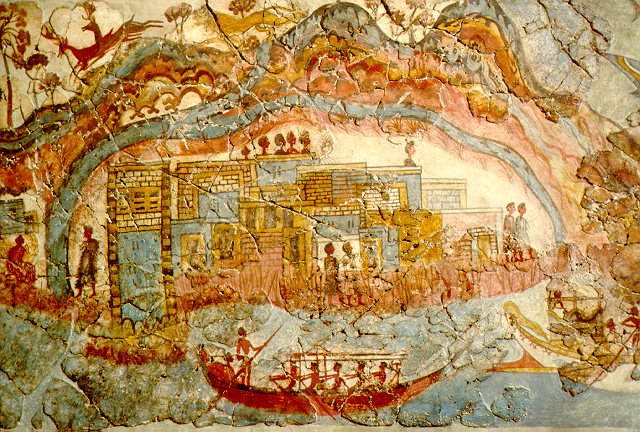 ...They do things differently there.' (L. P. Hartley, The Go-Between)
...They do things differently there.' (L. P. Hartley, The Go-Between)Setting any story in the distant past brings its own delights and perils. For me it allows my heroines to be engaging and ingenious, sometimes accepting historical society's conventions and restrictions, sometimes going against them, but always provoking inner or outward conflict. Heroes can be shown off to great advantage, really doing something - protecting, rescuing, struggling with great war-horses, battling the elements or the bad guys.
However, the backdrop against which all this high-stakes, high-adventure romance takes place needs to be carefully drawn and considered. Fashions are different, right down to underwear (or lack of it). Transport, law, weapons, animals, trees, climate, customs - these can all be very different from the present.
 My oldest book, in both creative genesis and the date at which it is set, is Bronze Lightning. This is set in the Bronze Age, before the eruption of Thera (the modern Greek island of Santorini), the island shown below in a Bronze age fresco. Some structures, such as the pyramids and Stonehenge, were already old when the story opens in 1562 BC, although these also looked different. The pyramids I have imagined with their wonderful limestone covering, which would have made them gleam a brilliant white in the landscape. Stonehenge was also complete and not yet fallen into the decay already familiar when Constable created his painting of it.
My oldest book, in both creative genesis and the date at which it is set, is Bronze Lightning. This is set in the Bronze Age, before the eruption of Thera (the modern Greek island of Santorini), the island shown below in a Bronze age fresco. Some structures, such as the pyramids and Stonehenge, were already old when the story opens in 1562 BC, although these also looked different. The pyramids I have imagined with their wonderful limestone covering, which would have made them gleam a brilliant white in the landscape. Stonehenge was also complete and not yet fallen into the decay already familiar when Constable created his painting of it.Ritual places are not the only things that were different in the distant past. Some activities, such as the smelting of metals, farming, brewing, the making of clothes, were all different from what came later and very different from our own time.
 Beliefs and religion were also very different and, given the few written sources we have from Bronze Age Europe, must be inferred from archaeology and other means. Fearn the hero believes in a Sky God who has some characters that are similar to the later Viking God Thor: all later religions tend to have 'clues' of past faiths in them. He also undergoes a trance state where he sees symbols that modern shamans have also reported seeing in trances and which have been painted by cave painters.
Beliefs and religion were also very different and, given the few written sources we have from Bronze Age Europe, must be inferred from archaeology and other means. Fearn the hero believes in a Sky God who has some characters that are similar to the later Viking God Thor: all later religions tend to have 'clues' of past faiths in them. He also undergoes a trance state where he sees symbols that modern shamans have also reported seeing in trances and which have been painted by cave painters.In Bronze Lightning I bring the heroine Sarmatia right to my own doorstep. The winter house she lives in is set where my parents' house is now, and the wild apple and cherry trees she sees in blossom are ones I have known since childhood. Lots of other details are changed, however, because the distant past truly is another country.
In the Bronze Age, the climate in England was warmer and drier than today. There was much more woodland, and animals such as beavers, bears, wolves and wild boar in the woods. We have lost all these creatures excerpt for the boar, which has escaped from farms in southern England and is making its home in woodland again. Lime trees flourished, and orchids and other flowers that are rare or extinct today. The sheep Sarmatia care for were more like Soay sheep, that do not flock and whose fleece is not at all like the thick fleeces of modern breeds. The cattle were smaller or completely wild. Even the stars she followed were different. Even the polar star hung in a different place in the Bronze Age.
I exploit these differences to show the past in my story, to remind my readers that they are in another time, another place... where magic and romance do truly go hand in hand.
2 comments:
What an incredible experience, Lindsay, this book must have been to write. Fascinating.
Thanks, Maggi! I admit it was a lot of research but also utterly different and compelling.
Post a Comment